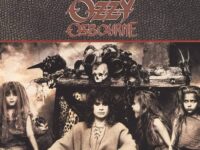As its opening song “Talk Shit, Get Shot” would suggest, much of Body Count’s return album Manslaughter revels in gratuitous violence and sex. That’s always been the case for Ice-T’s metal outfit, of course, but most of the band’s early output built that around a framework of social commentary.
A lot of the material on Manslaughter takes that violence and sex to an absurd level, but I have to admit that many of the tunes, like that opening song, are pretty catchy.
If there’s one reason that you should check out this record though, it has to be for their new version of Suicidal Tendencies’ “Institutionalized.” Metal fans will be familiar with the original, in which the subject’s concerned parents want to get some help for what they see as his problems. The classic ST song introduced the black humor that has permeated frontman Mike Muir’s work and spawned perhaps the band’s most memorable lyric as Muir calls for a Pepsi.
Ice-T and Co. update the song for a new world with “Institutionalized 2014,” and in many ways, it’s fitting. In this version, the anger factors are a wife upset by her husband playing too much XBox, a battle with a tech support guy over a password and an encounter with a vegan who has a problem with the subject’s lunch choices.
So, yeah, it’s definitely shallower than Muir’s original lyrics about society and the effects of conformity, but you could argue that society has also become shallower in the intervening years, obsessed with technology and less introspective. Now, I’m not saying that’s the statement Ice-T is attempting to make — because I don’t think that’s the case — but it would be genius, if it were.
No, the real reason I say “Institutionalized 2014” is why you should check out the album is because it’s hilarious. I mean, rolling around on the floor with tears pouring out of my eyes hilarious. We’ve all been in similar situations before, and the reaction of the subject in the song is probably along the lines of what we all wanted to say. Ice-T’s crazed delivery is perfect, and for me, it’s worth the price of admission alone.
But that’s not the only familiar song fans will hear. There’s also “99 Problems BC.” Apparently, Ice-T originally came up with the “99 Problems” concept which Jay-Z turned into a hit in the early 1990s. Here, he delivers it twice, once with an a capella verse before the rest of the band comes in, and again in a “rock mix” at the end of the album. This being a rock record, I wonder why he didn’t just give us the rock version, which is a little more interesting to me thanks to some cool noodling from guitarist Ernie C that’s absent on the first version. If you only know Jay-Z, though, don’t expect to recognize anything other than the chorus. The rest of this version is all about sex with absolutely no cleverness. It’s vulgar for vulgar’s sake, and if this is what Ice-T’s original was like, I’d say Jay-Z made an improvement — and I don’t like his version either.
Then, there’s “Black Voodoo Sex,” which revisits the song “Voodoo” from Body Count’s 1992 self-titled debut. This time the subject of the song meets the voodoo queen’s daughter, and the situation plays out … ummm … a little differently than it did the first time around. Sadly, “I Will Always Love You,” which comes later on the album is not a cover of the Dolly Parton country classic. That could potentially have been enough to push this to album-of-the-year status.
Outside of the familiar melodies and lyrics of those songs, the content of Manslaughter is a mixed bag. Body Count does try to return to some social commentary here and there.
The anti-drug song “Back to Rehab,” delivers on a familiar topic for the band, but doesn’t seem to have the flow of some of the other songs on the record. It certainly doesn’t have the impact of the ballad “The Winner Loses” from their debut, which covers the same subject.
Maybe the best song on the album is “Pop Bubble,” featuring Hatebreed vocalist Jamey Jasta. The song blends social commentary with the rap tradition of calling out other artists. The song encourages former hardcore rappers who have gone pop to tackle more serious subjects. While Ice-T says that he won’t name any names, he doesn’t make it difficult to figure out who he’s talking about either, even for a guy like me that knows next to nothing about hip-hop.
“Enter the Dark Side” is a slower, grittier tune that acknowledges that Ice-T is a long way from the ghetto these days, but also recognizes that the trip from the top to the bottom can be a short one. It showcases some of Ernie C’s tastiest guitar work on the album. On the flip side of that is “Wanna Be a Gangsta,” which tackles suburban kids who listen to rap and want to act out the songs. It outlines the realities of that lifestyle and, in Ice-T’s own unique way, encourages them to stay away from it and stay in school.
After all the gangbanging and sex on the album, there’s kind of a strange turn at the end with the aforementioned “I Will Always Love You,” a tribute to servicemen and women who have given their lives for the country. It’s not a flag-waving anthem, to say the least. In the Body Count style, it focuses on the darker side of that life, but still manages to offer a tribute to the troops that’s more than just the lip service of many such songs.
While it’s been a few years between Body Count records, you can certainly say that none of the ferocity is gone. Another thing that hasn’t changed is the smooth leads of Ernie C. While Ice-T’s raging grabs most of the spotlight, the talents of the guitarist are often overlooked. He’s a very underrated player, and if anything, his guitar work flows better on this record. There are several instances on Manslaughter when I find myself thinking the song would be better if Ice-T just got out of the way.
Admittedly, I’d like to see a little less focus on violence for violence’s sake in the lyrical approach, but I suppose it’s not that incredibly different from the horror violence of some other metal bands. Perhaps it’s just a bit more disturbing because it lands a little closer to home. I mean, the likelihood of being sacrificed in some sort of Satanic ritual is certainly far less than being shot in a botched robbery attempt at a convenience store.
In the end, Manslaughter probably won’t be a candidate for my album of the year, but it is entertaining — and with far more good moments than bad. It’s at least on par with Body Count’s debut record and, in some ways, a superior album. The songs here often flow better. While there are some rough spots here and there, the band seems to be more comfortable in its skin now than perhaps it was on some of those earlier albums.
- How Black Sabbath’s Self-Titled Debut Invented a New Genre of Music - February 5, 2025
- Alestorm, Ratt, Zeal & Ardor + Others: Fred Phillips’ Best of 2024 Metal and Hard Rock Songs - January 26, 2025
- Cody Jinks, Blackberry Smoke + Others: Fred Phillips’ Best of 2024 Country and Southern Rock - January 20, 2025




